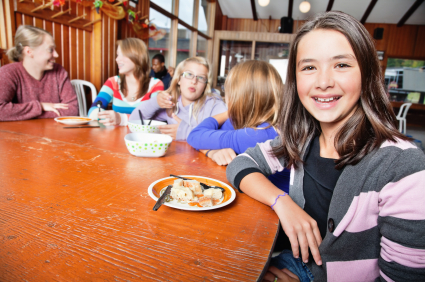
Summer camp offers a lot more than a vacation for your children. It's an opportunity for your child to explore a world that goes beyond his/her neighborhood. It also presents an opportunity for you and your child to practice "letting go." This allows children to develop independence and a confident sense of self. It will help them to make new friends, develop their social skills, learn about teamwork, and about being creative. This time also allows parents an opportunity to take care of themselves so that they will feel refreshed and rejuvenated when their child returns home.
To help prepare yourself and your child for camp, follow the 5 steps below.
1) Getting Familiar With Camp Ahead of Time
Many camps offer orientation or an open house, which is a great time for kids to meet the counselors and other campers. If this isn't an option, visiting the camp setting, even if it's totally vacant, can generate familiarity and excited anticipation.
Taking the bus? Get the bus route and take a road trip with your child before camp begins. Point out landmarks and points of interest that they will recognize on the route to and from camp.
Speak with the camp director well before cpm is scheduled to begin. Take this opportunity to share anything you feel the camp should know about your child. This could include something as simple as a personality quirk or important medical or psychological needs they may have. It's a good idea to include this information on the camp registration forms as well.
2) Keeping Your Child Involved
Depending on the age of your child, including them in the decisions about camp is important. Get his/her input on where to go and what to pack, all the while keeping your parenting hat on if interjection is needed. If your child feels a part of the decision-making process, his/her chances of having a positive experience will improve.
Shop for your camp gear as a team. As a parent you'll feel comfortable knowing your child is well equipped, while he/she will be thrilled with the new duds.
A couple weeks before camp, practice bunk activities at home. Read a few chapters by flashlight, put laundry in a laundry bag, and make the bed. For younger kids that normally depend on you for their personal hygiene, get them used to going to the bathroom with the toiletries kit, and showering independently.
Be excited for them! Let them know they are going to have the time of their life at camp. This goes a long way toward building up their confidence level.
3) New Friendships To Come
Summer camp presents a rare opportunity for some kids. It's great way to meet children that may not attend the same school. Encourage picture taking with their new friends to create great camp memories. Dropping the film off for developing, picking up the pictures, and putting together a scrapbook are all wonderful ways to finish off the summer.
Pack right for a positive experience. After checking with the camp to find out what's allowed, pack water toys for good old-fashioned splashing fun. Children will have a blast while cooling off from the summer heat. A flashlight and batteries are a good idea as well. What ghost story would be complete without them? Flashlights are ideal for making shadow puppets too, and lets not forget about finding their way in the dark during late-night pranks.
4) Getting Your Child Ready
It's almost time to leave for camp and you've sensed a feeling of uneasiness in your child. She's worried about going away and being without you. Sit down and talk about these feelings, all the while listening and encouraging them. Express your confidence in their ability to handle being away from home. (i.e. "I know you're a little nervous right now, but I just KNOW as soon as you get there you'll forget all about it because of all the fun you'll be having!")
Be sure to address your child's concerns, and if you feel they are important enough, be sure to share those concerns with the camp director. They'll be able to help you find the best solution for your child.
It's natural to feel nervous when faced with something new. What if the other kids tease me? What if the food taste bad? These are very common concerns for first time campers. let your child know that you are there for them and will help them with any concerns, but affirm that you made this decision together and plant o follow through and give it a chance. The first couple of days can sometimes be a bit trying until your child acclimates, makes friends, and gets into the swing of the camp's schedule. Sticking it out for those crucial first days can make all the difference.
Did you go to camp as a child? Be sure to share stories of your happy camp experiences! This can really help boost your child's confidence and calm their nerves.
Have a discussion about bullying. Explain that name calling, teasing and being rude to other children is not acceptable. Remind them that if they experience that from others to let you and the camp staff know as well.
5) Time To Let Go
Say your goodbyes in the car on the way to camp or the bus. Don't prolong it with sentiments that may make your child feel like they can't leave you. Lots of smiles and a quick drop off with a hug are the best way to "let go" and let your child's adventure begin.
No tears! Don't let your child see you crying. That can cause them to feel badly and you want this to be a positive experience for your child. Wear sunglasses if you must and keep that happy smile on your face. Remember, you'll see them again soon, let them have a great time while they're gone.
